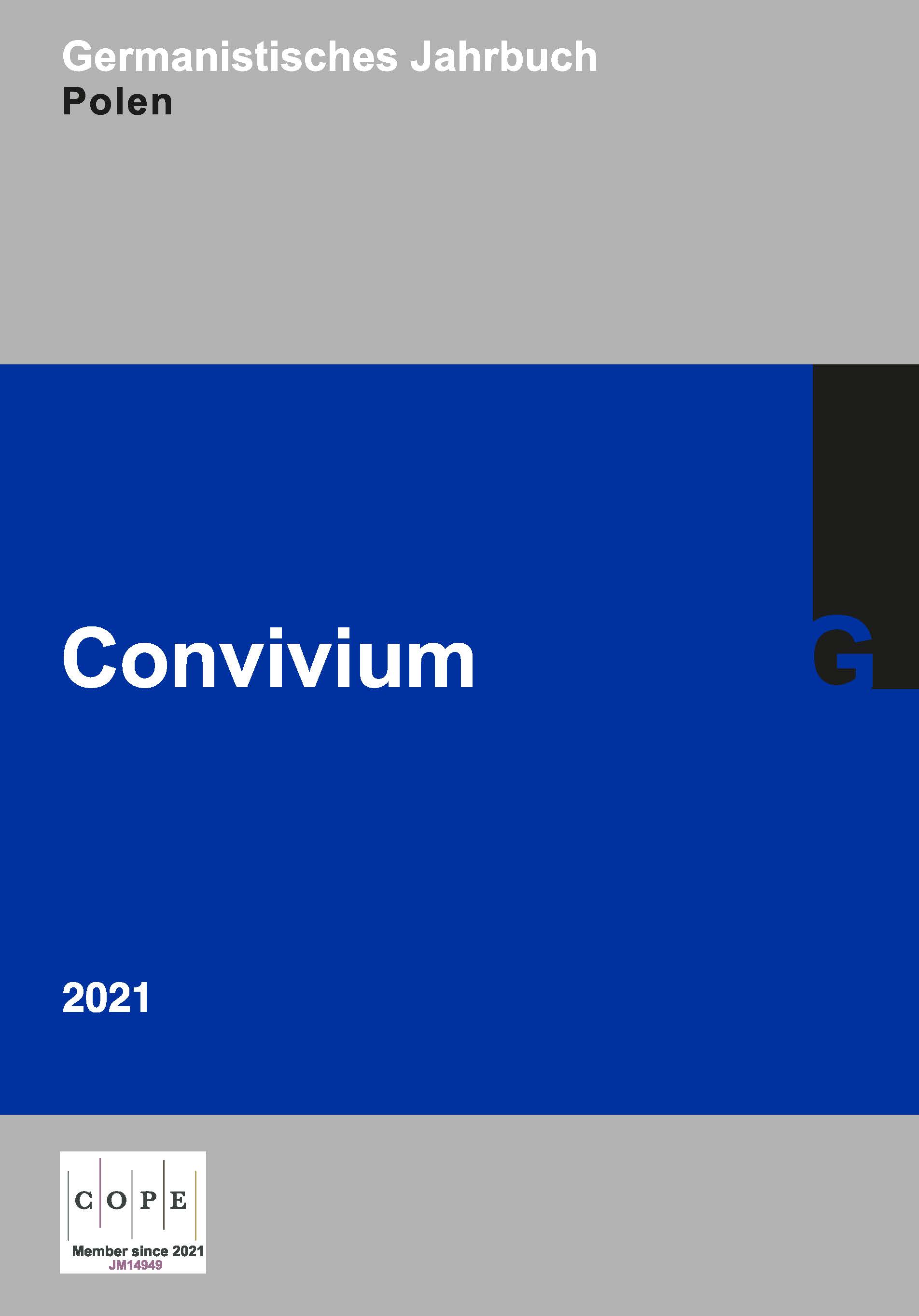HERMANN LENZ and the Eugene Rapp novel series – an attempt to narrate the literary field of the Federal Republic of Germany?
DOI:
https://doi.org/10.18778/2196-8403.2021.06Keywords:
HERMANN LENZ, literary-business novels, autofiction, paratext, narrative, literary fieldAbstract
Faced with the omnipresent economization and market regulation of the artistic field, Hegel had already discussed the death of art in the early 19th century in his Vorlesungen über die Ästhetik; yet the artist was hardly dead, and remains alive today. Paratexts and interviews show artists’ attempts at self-creation – in many contexts, including post-structural, post-subjective and post-factual. The goal is to attract attention through self-presentation in public and gathering symbolic capital – for the sake of the market, or the artist himself, alternatively to transform these processes into semi-fictional narratives.
The fact that reflection is always present in the literary sphere is analyzed in HERMANN LENZ’S novels revolving around the literary business. By confronting literary life, LENZ was able to reanimate the sense of autonomy and awareness of authorship.
References
BEETZ, MANFRED (2003): Konversationskultur und Gesprächsregie in den Monatsgesprächen. In: BEETZ, MANFRED / JAUMANN, HERMANN (eds.): Thomasius im literarischen Feld. Neue Beiträge zur Erforschung seines Werkes im historischen Kontext. Tübingen, 35-60.
Google Scholar
DOI: https://doi.org/10.1515/9783110932331.35
BOURDIEU, PIERRE (2001): Die Regeln der Kunst. Genese und Struktur des literarischen Feldes. Aus dem Französischen v. Bernd Schwibbs und Achim Nusser. Frankfurt a.M.
Google Scholar
BOURDIEU, PIERRE (1988/2018): Homo academicus. Aus dem Französischen von Bernd Schwibs. Berlin / Frankfurt a.M.
Google Scholar
BRIEGLEB, KLAUS (1992): Weiterschreiben! Wege zu einer deutschen literarischen ‚Postmoderne‘. In: BRIEGLEB, KLAUS / WEIGEL, SIGRID (eds.): Hansers Sozialgeschichte der deutschen Literatur vom 16. Jahrhundert bis zur Gegenwart. Bd. 12. Gegenwartsliteratur seit 1968. München, 340-381.
Google Scholar
ENGEL, MANFRED (2018): Kontexte und Kontextrelevanzen in der Literaturwissenschaft. In: KulturPoetik 1:71-89.
Google Scholar
DOI: https://doi.org/10.13109/kult.2018.18.1.71
FRANZEN, JOHANNES (2018): Indiskrete Fiktionen. Theorie und Praxis des Schlüsselromans 1960-2015. Göttingen.
Google Scholar
FÜSSEL, MARIAN (2005): Intellektuelle Felder. Zu den Differenzen von Bourdieus Wissenssoziologie und der Konstellationsforschung. In: MULSOW, MARTIN / STAMM, MARCELO (eds.): Konstellationsforschung. Frankfurt a.M., 188-206.
Google Scholar
GERSTENBRÄUN-KRUG, MARTIN / NADJA REINHARD (2018) (eds.): Paratextuelle Politik und Praxis. Interdependenzen von Werk und Autorschaft. Wien.
Google Scholar
DOI: https://doi.org/10.7767/9783205208396
HANDKE, PETER (1973): Tage wie ausgeblasene Eier. Einladung, Hermann Lenz zu lesen. In: Süddeutsche Zeitung (22./23. Dezember 1973).
Google Scholar
HANDKE, PETER (2007): Leben ohne Poesie. Gedichte. Frankfurt a.M.
Google Scholar
HEIßENBÜTTEL, HELMUT (1980): Gruppenkritik. In: DERS.: Textbücher 1-6. Stuttgart, 227-229.
Google Scholar
KREUZER, INGRID / KREUZER, HELMUT (eds.) (1981): Über Hermann Lenz. Dokumente seiner Rezeption (1947-1979) und autobiographische Texte. München.
Google Scholar
KRÜGER, MICHAEL (2003): Nachwort. In: LENZ, HERMANN: Vielleicht lebst du weiter im Stein. Gedichte. Frankfurt a.M., 147-155.
Google Scholar
LENZ, HERMANN (1983): Ein Fremdling. Roman. Frankfurt a.M.
Google Scholar
LENZ, HERMANN (1997): Freunde. Roman. Frankfurt a.M. / Leipzig.
Google Scholar
LENZ, HERMANN (2003): Vielleicht lebst du weiter im Stein. Gedichte. Frankfurt a.M.
Google Scholar
MARTUS, STEFFEN (2007): Werkpolitik. Zur Literaturgeschichte kritischer Kommunikation vom 17. bis ins 20. Jahrhundert mit Studien zu Klopstock, Tieck, Goethe und George. Berlin.
Google Scholar
DOI: https://doi.org/10.1515/9783110201772
DE MONTHERLANT, HENRY (1968): Geh, spiel mit diesem Staub. Tagebücher 1958-1964. Aus dem Französischen v. Karl August Horst. Köln / Berlin 1968.
Google Scholar
DE MONTHERLANT, HENRY (1969): Tagebücher 1930-1940. Aus dem Französischen v. Karl August Horst. München.
Google Scholar
PIMTO, LOUIS / SCHULTHEIS, FRANZ (eds.) (1997): Streifzüge durch das literarische Feld. Texte von Pierre Bourdieu, Christophe Charle, Moulaud Mammeri, Jean-Michel Péru, Michael Pollak, Anne-Marie Thiesse. Konstanz (Edition discours; Bd. 4).
Google Scholar
RÖSCH, GERTRUD MARIA (ed.) (2005): Codes, Geheimtext und Verschlüsselung. Geschichte und Gegenwart einer Kulturpraxis. Tübingen.
Google Scholar
VOß, TORSTEN (2019): „Drumherum geschrieben?“. Zur Funktion auktorialer Paratexte für die Inszenierung von Autorschaft um 1800. Hannover.
Google Scholar
WAGNER-EGELHAAF, MARTINA (ed.) (2013): Auto(r)fiktion. Literarische Verfahren der Selbstkonstruktion. Bielefeld.
Google Scholar
WEGMANN, THOMAS (2016): ‚Es stimmt ja immer zugleich alles und nichts‘: Zur Theorie des Autors und zum Tod als Gegenstand in Interviews: Müller, Bernhard, Derrida. In: The German Review: Literature, Culture, Theory 91:7-24.
Google Scholar
DOI: https://doi.org/10.1080/00168890.2016.1133950
Downloads
Published
How to Cite
Issue
Section
License

This work is licensed under a Creative Commons Attribution-NonCommercial-NoDerivatives 4.0 International License.










